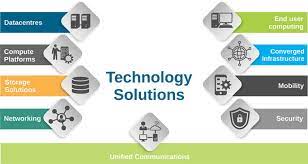The Power of Technology Innovation
Technology innovation has been a driving force behind the advancement of societies and economies across the globe. From the invention of the wheel to the development of artificial intelligence, technological breakthroughs have shaped our world in profound ways.
One of the key aspects of technology innovation is its ability to solve complex problems and improve efficiency. Whether it’s streamlining business processes, enhancing communication, or revolutionizing healthcare, innovative technologies have a transformative impact on various industries.
Furthermore, technology innovation fosters creativity and encourages continuous learning. It challenges individuals and organizations to think outside the box, experiment with new ideas, and push boundaries to achieve greater heights.
In today’s fast-paced digital age, staying ahead in the competitive landscape requires a commitment to embracing technology innovation. Companies that invest in research and development, foster a culture of innovation, and adapt to changing technological trends are more likely to thrive in an ever-evolving market.
Moreover, technology innovation plays a crucial role in addressing global challenges such as climate change, healthcare access, and sustainable development. By harnessing the power of innovative technologies like renewable energy solutions, telemedicine platforms, and smart cities infrastructure, we can create a more sustainable and inclusive future for all.
In conclusion, technology innovation is not just about creating new gadgets or software—it’s about driving positive change and shaping a better tomorrow for generations to come. By embracing technology innovation as a catalyst for progress, we can unlock endless possibilities and pave the way for a brighter future.
6 Ways Technology Innovation Transforms Our World: From Boosting Productivity to Advancing Global Connectivity
- Enhances efficiency and productivity in various industries.
- Fosters creativity and encourages continuous learning.
- Improves communication and connectivity on a global scale.
- Drives economic growth and creates new job opportunities.
- Addresses complex challenges with innovative solutions.
- Leads to advancements in healthcare, education, and environmental sustainability.
5 Challenges of Technology Innovation: Job Displacement, Privacy Issues, Digital Divide, Tech Dependency, and Environmental Impact
- 1. Displacement of Jobs
- 2. Privacy Concerns
- 3. Digital Divide
- 4. Dependency on Technology
- 5. Environmental Impact
Enhances efficiency and productivity in various industries.
Technology innovation plays a pivotal role in enhancing efficiency and productivity across diverse industries. By introducing automated processes, advanced analytics, and streamlined communication tools, technology empowers businesses to optimize their operations and maximize output. From manufacturing to healthcare to finance, the integration of innovative technologies not only accelerates tasks but also improves accuracy, reduces errors, and ultimately boosts overall performance. This increased efficiency allows organizations to achieve higher levels of productivity, meet market demands more effectively, and stay competitive in today’s rapidly evolving business landscape.
Fosters creativity and encourages continuous learning.
Technology innovation serves as a catalyst for fostering creativity and promoting lifelong learning. By introducing new tools, platforms, and possibilities, technology inspires individuals to think creatively, explore new ideas, and push the boundaries of what is possible. This constant evolution encourages a culture of continuous learning, where individuals are motivated to adapt to new technologies, acquire new skills, and stay abreast of industry trends. Ultimately, the synergy between technology innovation, creativity, and continuous learning fuels personal growth and professional development in today’s dynamic digital landscape.
Improves communication and connectivity on a global scale.
Technology innovation has significantly improved communication and connectivity on a global scale, breaking down barriers of distance and time. Through the development of advanced communication tools such as video conferencing, social media platforms, and instant messaging apps, people from different parts of the world can now easily connect, collaborate, and share information in real-time. This enhanced connectivity not only fosters cultural exchange and understanding but also facilitates seamless business operations and enables swift responses to global challenges. The ability to communicate across borders instantaneously has transformed the way we interact with one another and has created a more interconnected world where ideas can flow freely and relationships can be strengthened effortlessly.
Drives economic growth and creates new job opportunities.
Technology innovation plays a pivotal role in driving economic growth and creating new job opportunities. By introducing disruptive technologies and digital solutions, businesses can increase productivity, efficiency, and competitiveness, leading to overall economic expansion. Moreover, the demand for skilled professionals in emerging tech fields such as artificial intelligence, cybersecurity, and data science continues to rise, offering individuals exciting career prospects and contributing to a dynamic job market. Embracing technology innovation not only boosts economic development but also fosters a thriving workforce that is equipped to meet the challenges of tomorrow’s digital age.
Addresses complex challenges with innovative solutions.
Technology innovation plays a pivotal role in addressing complex challenges by offering innovative solutions that were once thought impossible. From developing advanced medical treatments to creating sustainable energy sources, technological advancements have revolutionized how we tackle intricate problems. By pushing the boundaries of what is achievable, technology innovation enables us to find creative and effective ways to overcome obstacles and make significant strides towards a better future.
Leads to advancements in healthcare, education, and environmental sustainability.
Technology innovation has led to remarkable advancements in healthcare, education, and environmental sustainability. In healthcare, cutting-edge technologies such as telemedicine, personalized medicine, and medical imaging have revolutionized patient care and treatment outcomes. In education, digital learning platforms, virtual reality simulations, and online resources have transformed the way students learn and educators teach. Additionally, innovative solutions in environmental sustainability like renewable energy technologies, smart grid systems, and waste management tools are helping to mitigate climate change and promote a greener future for our planet. The continuous progress in these areas showcases the immense potential of technology innovation to address critical challenges and improve the quality of life for people worldwide.
1. Displacement of Jobs
Technology innovation, while bringing about numerous benefits and advancements, also poses the con of displacing jobs. Automation and the integration of new technologies can result in certain job roles becoming obsolete, leading to unemployment in specific sectors. This displacement of jobs due to technology innovation highlights the importance of upskilling and reskilling the workforce to adapt to the changing demands of the digital economy. Efforts to address this issue include promoting lifelong learning initiatives and fostering a culture of continuous professional development to mitigate the impact of job displacement caused by technological advancements.
2. Privacy Concerns
Advances in technology bring about significant privacy concerns, particularly regarding data security and personal information breaches. As innovation progresses, the collection and storage of vast amounts of data become more prevalent, increasing the risk of unauthorized access and misuse of sensitive information. This heightened vulnerability raises important questions about how to safeguard individuals’ privacy rights in an increasingly interconnected digital world. Addressing these privacy concerns is crucial to ensuring that technological advancements benefit society without compromising individuals’ right to data protection and confidentiality.
3. Digital Divide
The digital age has brought about a significant con of technology innovation known as the digital divide. This divide highlights the disparity in access to technological advancements, creating a widening gap between individuals who have the resources and means to benefit from these innovations and those who do not. As technology continues to advance rapidly, addressing the issue of unequal access becomes crucial to ensure that all members of society have equal opportunities to harness the benefits of technological progress and participate fully in the digital world.
4. Dependency on Technology
One significant con of technology innovation is the increasing dependency on technology, which can lead to a decline in human interaction, erosion of essential skills, and vulnerability to technological breakdowns. Relying heavily on technology for communication and problem-solving may diminish face-to-face interactions and interpersonal relationships, ultimately affecting social bonds and emotional connections. Moreover, an overreliance on automated processes can diminish critical thinking abilities and practical skills that are essential for adapting to unforeseen challenges. Additionally, a lack of preparedness to handle technological failures can leave individuals and organizations vulnerable to disruptions in operations, highlighting the importance of maintaining a balance between leveraging technology advancements and preserving fundamental human capabilities.
5. Environmental Impact
Some technology innovations have a significant environmental impact, contributing to environmental degradation through e-waste generation, high energy consumption, and increased carbon emissions. The rapid pace of technological advancement often leads to the disposal of outdated devices, resulting in a growing amount of electronic waste that poses challenges for proper recycling and disposal. Additionally, the energy-intensive nature of certain technologies and the reliance on fossil fuels for power generation contribute to carbon emissions that exacerbate climate change. It is crucial for innovators and consumers alike to consider the environmental consequences of technology innovation and work towards sustainable solutions to mitigate these negative effects on our planet.



